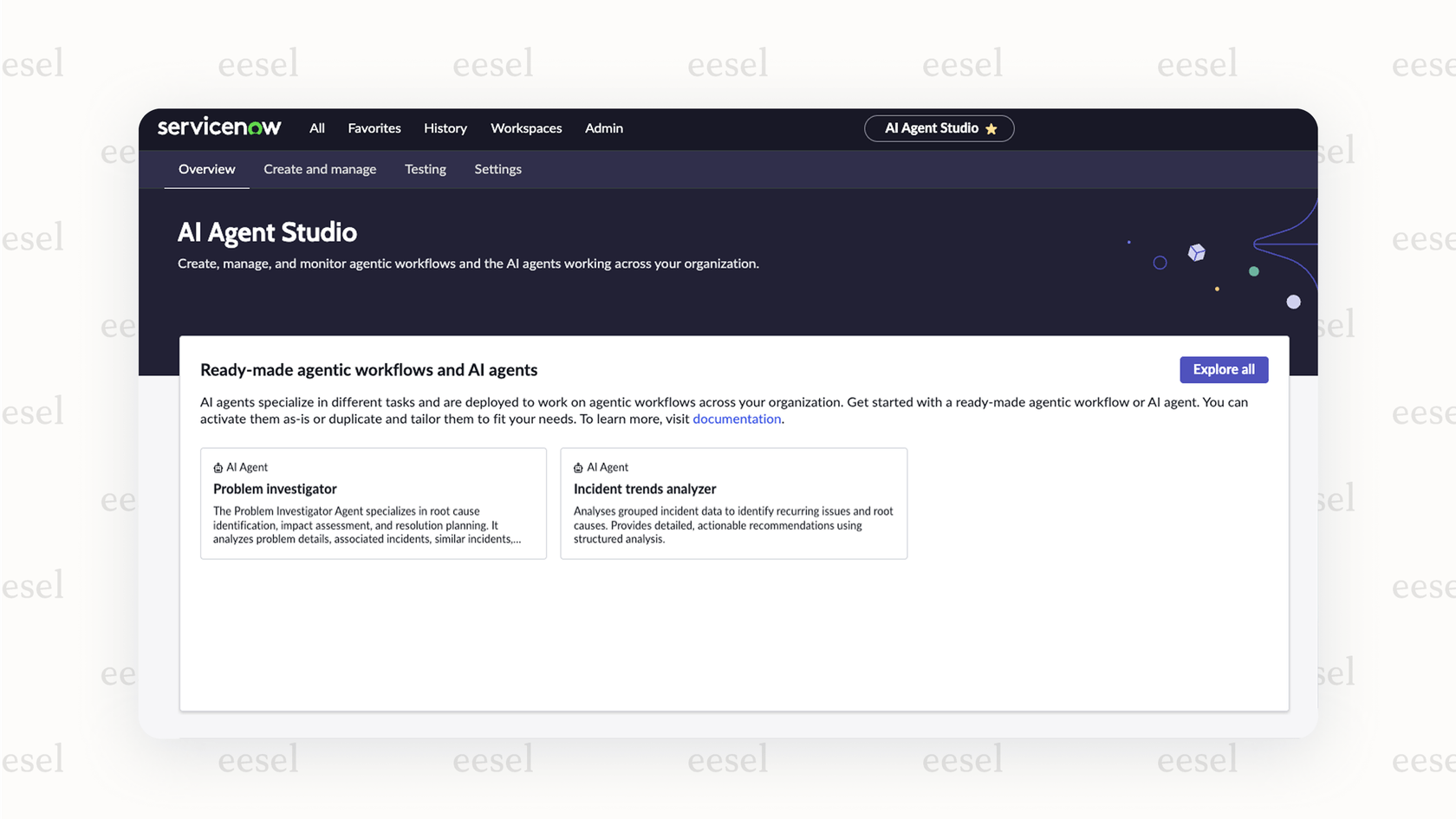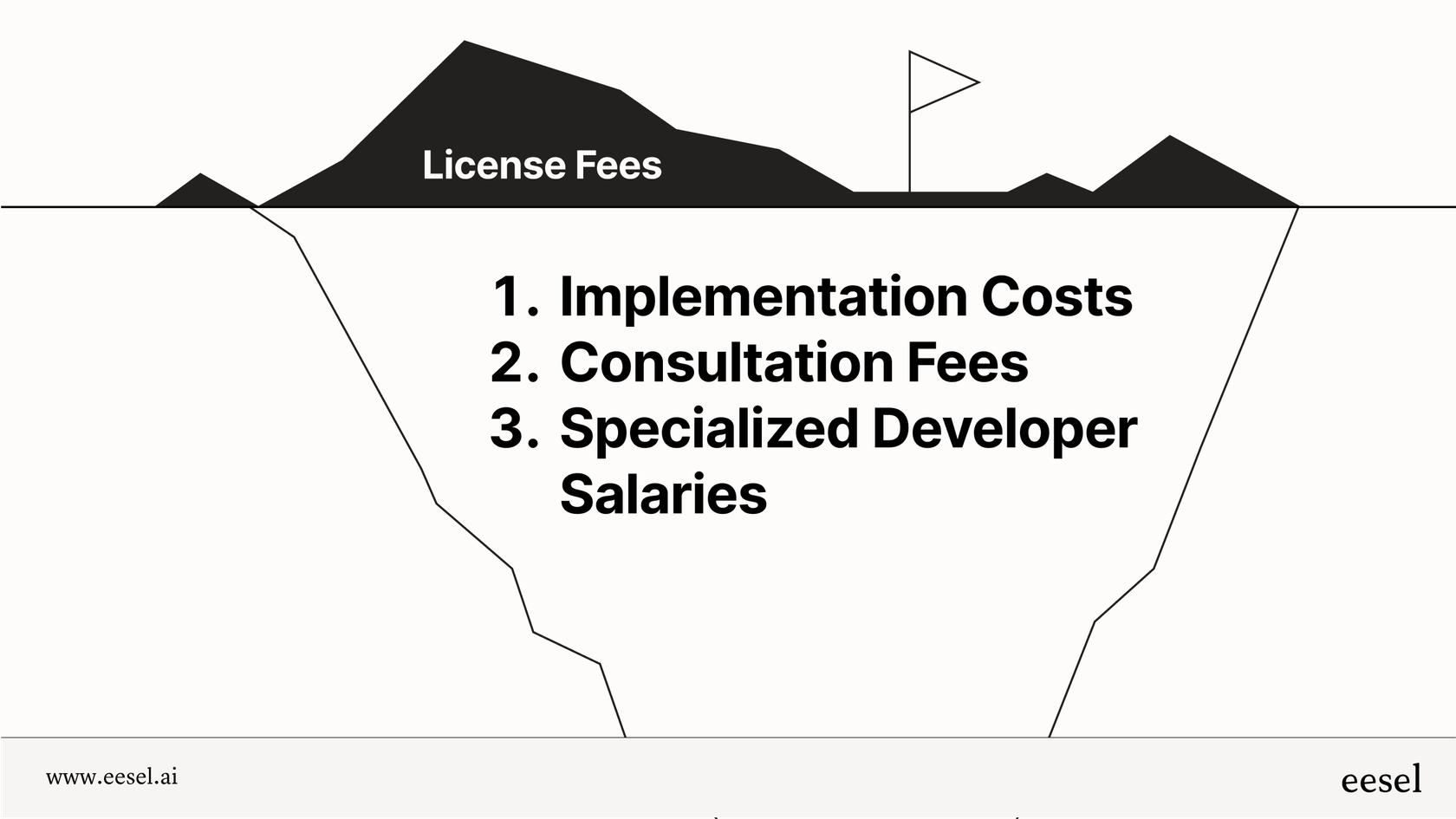
There’s a ton of buzz around agentic AI right now, and ServiceNow is definitely at the center of it, painting a picture of a future where digital workers handle just about everything. But if you spend any time on forums like Reddit, you see a pretty big gap between the slick marketing demos and what developers and admins are actually dealing with. It’s a mix of excitement for what’s possible and a whole lot of frustration with the day-to-day reality.
So, what's the real story here?
This guide is here to cut through that noise. We’ll give you a clear, balanced look at what ServiceNow AI Agents are, how they're supposed to work, and the real-world hurdles you should know about, like mind-numbing complexity and hidden costs, before you even think about diving in.
What are ServiceNow AI agents?
At their core, ServiceNow AI Agents are basically autonomous programs designed to tackle complex, multi-step tasks without a human needing to click through every single step. This is a pretty big jump from your standard chatbot or even a generative AI helper like Now Assist. Agentic AI doesn't just suggest an answer; it actually takes action.
The big idea is to create a "digital workforce" that can automate entire processes across IT, HR, and customer service. Imagine an agent that not only flags a security threat but also resets passwords, opens a high-priority ticket, and pings the on-call team, all by itself.
These agents are built deep within the ServiceNow ecosystem, which is both their greatest strength and a major drawback. They have native access to all your platform data, which is fantastic for context. But it also means you’re completely locked into their world. These are powerful, heavy-duty tools designed for massive organizations that are ready to go all-in on a single platform.
How ServiceNow's agentic AI framework works
To really get what ServiceNow AI Agents are all about, you have to wrap your head around the complex, multi-layered platform they live on. This isn't some simple tool you just flip a switch on. It’s an entire ecosystem you have to build, manage, and constantly maintain.
Building agents with the AI Agent Studio
The AI Agent Studio is the command center where you’re supposed to build and tweak your AI agents. ServiceNow claims you can use natural language to tell an agent what to do, defining its role, personality, and the tools it has access to.

In the real world, users are telling a different story. <quote text="Feedback suggests it's "far from ready," with one person saying it feels like "teaching a 1 year old to sign opera."" sourceIcon="https://www.iconpacks.net/icons/2/free-reddit-logo-icon-2436-thumb.png" sourceName="Reddit" sourceLink="https://www.reddit.com/r/servicenow/comments/1m2i828/a_real_thread_about_ai_agents/"> Getting it to work properly requires an enormous amount of prompt engineering and fine-tuning. Instead of writing code, you end up spending all your time trying to craft the perfect English sentence just to keep the AI from going completely off the rails.
While ServiceNow requires this dedicated studio and a long development cycle, other tools like eesel AI have a much simpler, self-serve setup. You can get an AI agent live in a few minutes, not months, because it learns directly from the thousands of support tickets you've already resolved. This completely cuts out the time you'd otherwise spend trying to design the perfect prompt from scratch.
The coordination layer: AI Agent Orchestrator and Fabric
Because you might have dozens of these specialized bots running around, ServiceNow created the AI Agent Orchestrator to act as a "conductor," making sure all your agents work together toward a single goal without stepping on each other's toes. Next to it is the AI Agent Fabric, a framework that lets you plug in third-party agents and tools.
These parts are necessary because the platform itself is so complicated. But let's be honest, for most teams, managing an "orchestra" of bots is complete overkill. You don't need a complex system to coordinate bots if you have one smart, unified AI that can handle the job from the get-go.
Platforms like eesel AI solve this by pulling knowledge from all your different sources, your helpdesk, Confluence, Google Docs, and past tickets, into a single brain. There's no need for a complicated orchestrator because the AI already has all the context it needs to resolve issues from start to finish.
The command center: AI Control Tower
Finally, the AI Control Tower is the central dashboard where you’re meant to manage and monitor everything to prevent "AI sprawl." In a huge company with hundreds of bots, this is vital for governance. But for teams that just want to solve problems and move quickly, it’s another layer of complexity to learn and manage.
The whole system is undeniably powerful, but it’s a lot to take on. It feels designed for a top-down, multi-year AI transformation project, not for a team that needs to deliver value this quarter.
Common use cases and challenges
ServiceNow pushes a wide range of use cases for its AI agents, but what people are saying online tells a story of some pretty significant roadblocks.
Here are a few of the most common applications and the challenges people run into when they try to actually implement them:
-
ITSM Automation: The dream is to automatically resolve incidents, handle change requests, and triage tickets by looking up knowledge articles.
-
HR Service Delivery: AI agents are supposed to manage employee onboarding, answer questions about company policy, and process time-off requests.
-
Customer Service Management (CSM): The promise is automated answers to common customer questions and smarter case routing.

__
These all sound great in a presentation, but the reality often doesn't live up to the hype.
-
Challenge 1: Poor knowledge and hallucinations A frequent complaint is that the AI just isn't that bright. <quote text="Users report that it fails to summarize ticket descriptions correctly, saying it "almost randomly picked words and put them together."" sourceIcon="https://www.iconpacks.net/icons/2/free-reddit-logo-icon-2436-thumb.png" sourceName="Reddit" sourceLink="https://www.reddit.com"> Even worse, it sometimes generates resolution notes with code that doesn't even exist in their system. The AI really struggles to ground itself in a company's actual knowledge base and often just makes things up, making it totally unreliable for important tasks.
-
Challenge 2: Painful configuration None of this works straight out of the box. Getting a single use case up and running requires a massive amount of configuration and tweaking. <quote text="As one user put it, "It needs so much more config to use than I expected."" sourceIcon="https://www.iconpacks.net/icons/2/free-reddit-logo-icon-2436-thumb.png" sourceName="Reddit" sourceLink="https://www.reddit.com"> The documentation is often confusing or way too detailed for simple things while lacking specifics for critical setups, leaving admins feeling frustrated and stuck.
This is where a different approach can make all the difference. Tools like eesel AI are designed to solve these exact problems. eesel AI automatically trains on your historical support tickets, so it learns your specific context, your team's language, and your most common issues right from day one. It also connects to all the knowledge sources you already have, whether that’s in your helpdesk or scattered across different apps.
Best of all, eesel AI has a powerful simulation mode. Before you ever let it talk to a real customer, you can run it against thousands of your past tickets to see exactly how it would have performed. You get a precise resolution rate and can check every single response, which removes all the guesswork and risk from the equation.
Pricing: The hidden enterprise cost
So, how much does all this actually cost? Good luck finding out.
ServiceNow doesn’t publish pricing for its AI Agent features. If you try to find a pricing page, you’ll probably see a "page not found" error or a form telling you to "Contact Sales."

For anyone trying to buy software in 2025, that’s a huge red flag. It means:
-
You can't figure out on your own if it even fits your budget.
-
The price is negotiated behind closed doors, a process that heavily favors huge companies with massive budgets and procurement teams.
-
Users have reported some eye-watering costs, one mentioned a quote of "over $800 per person," plus a transaction-based model that can burn through your budget faster than you can say "renewal."
This secretive, enterprise-first model is a world away from modern software tools. Here’s a quick comparison:
| Feature | ServiceNow AI Agents | eesel AI |
|---|---|---|
| Pricing Model | Secretive, requires sales call | Transparent, public pricing page |
| Cost Basis | Reportedly per-user + transactions | Flat fee based on interactions |
| Contracts | Usually long-term, enterprise-level | Flexible monthly or annual plans |
| Self-Serve | No, requires demos and sales | Yes, go live in minutes on your own |
With eesel AI, the pricing is clear, predictable, and available for anyone to see. Plans are based on a flat fee for a certain number of AI interactions, so you're never surprised by a giant bill after a busy month. You can even start on a monthly plan and cancel anytime, giving you a risk-free way to prove its value.
Powerful for the enterprise, but a headache for everyone else
There’s no denying that ServiceNow AI Agents are part of a powerful, all-in-one platform. For a Fortune 500 company with a dedicated team of ServiceNow developers and a multi-million dollar budget, it might just be the right long-term move.
But that power comes with a heavy price: immense complexity, secretive and likely very high costs, and a steep learning curve that can take months or even years to deliver real value. The main challenge isn't just buying a tool; it's committing your entire organization to a single ecosystem that demands special expertise and a huge investment to manage.
So, the question you should be asking your team is this: do you need a complicated, multi-year AI transformation project, or do you need a practical tool that starts solving your support problems today?
A simpler alternative: Faster support automation with eesel AI
If you want the power of agentic AI without the enterprise baggage, eesel AI was built for you. It’s designed for teams that need to move fast and show results now.
Here’s how it’s different:
-
Go live in minutes: Connect your helpdesk and knowledge sources with just a few clicks. No sales calls, no mandatory demos.
-
Test with confidence: Use the simulation mode to see exactly how the AI will perform on your real-world tickets before you turn it on.
-
Stay in control: Start by automating just one ticket type or workflow, then slowly expand as you get more comfortable.
-
Predictable costs: With clear, transparent pricing, you’ll always know exactly what you’re paying.
Ready to see how fast you can get your support automated? Start your free eesel AI trial today.
Frequently asked questions
ServiceNow AI Agents are autonomous programs that execute complex, multi-step tasks without constant human intervention. They aim to create a "digital workforce" to automate entire processes across IT, HR, and customer service by taking action, not just suggesting solutions.
Unlike basic chatbots that suggest answers, ServiceNow AI Agents are designed to take action and automate entire processes autonomously. They are deeply integrated within the ServiceNow ecosystem, allowing them native access to platform data for comprehensive, action-oriented task execution.
The framework includes the AI Agent Studio for building and defining agents, the AI Agent Orchestrator for coordinating multiple agents, and the AI Agent Control Tower for centralized monitoring and governance. This layered approach manages complex agent interactions across the platform.
ServiceNow AI Agents are commonly applied in ITSM for resolving incidents and managing change requests, HR for onboarding and policy questions, and Customer Service Management for automated query responses and case routing. They aim to automate repetitive tasks in these areas.
Users frequently report challenges with poor knowledge leading to hallucinations and painful, extensive configuration requirements. The agents often struggle to correctly ground themselves in company-specific knowledge, demanding significant prompt engineering and fine-tuning to perform reliably.
ServiceNow does not publicly list pricing for its AI Agent features, requiring direct sales contact. Users have reported significant costs, often based on a per-user model combined with transaction-based fees, making it an enterprise-level investment.
ServiceNow AI Agents are primarily designed for large enterprises and Fortune 500 companies with substantial budgets and dedicated teams of ServiceNow developers. They are best suited for organizations ready to undertake a multi-year AI transformation project within a single, integrated platform.
Share this post

Article by
Stevia Putri
Stevia Putri is a marketing generalist at eesel AI, where she helps turn powerful AI tools into stories that resonate. She’s driven by curiosity, clarity, and the human side of technology.







